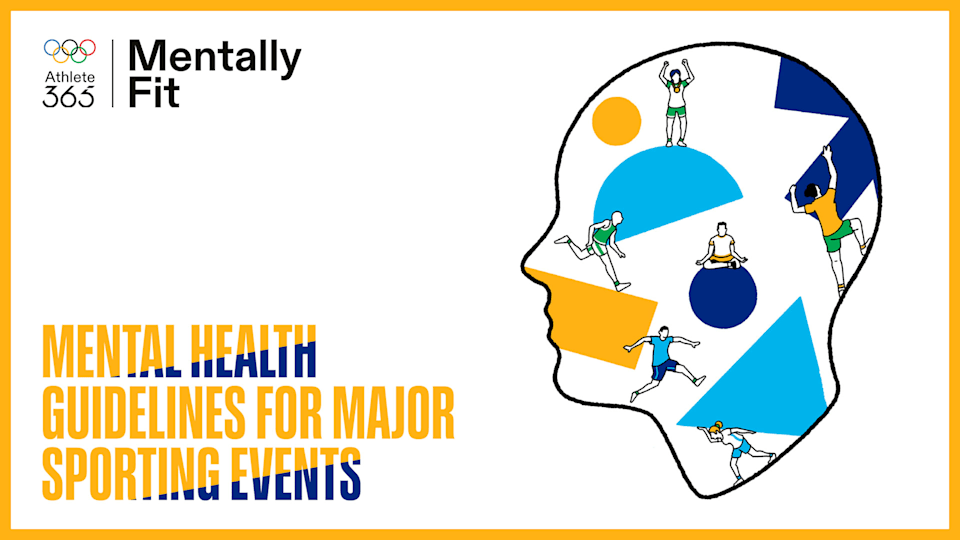Championing mental health: IOC’s blueprint for major sports events
Following the positive impact of the mental health services provided to athletes at the Olympic Games Paris 2024, the International Olympic Committee (IOC) is sharing its approach with the wider Olympic Movement.

Through the newly published “Mental Health Guidelines for Major Sporting Events”, the IOC is bringing together invaluable resources and guidelines to ensure that safe, comprehensive and effective mental health measures are built into sports event planning, from inception to implementation. This initiative is intended to set a new standard in athlete wellbeing, fostering a supportive environment for all competitors.
Providing a template for holistic support
The guidelines cover pre-, during- and post-event best practices, highlighting the importance of a holistic approach to athlete mental health, and include a wealth of additional resources and supporting research.
The aim is to ensure that the mental well-being of athletes and entourage members is adequately supported, while simultaneously encouraging conversation around the importance of good mental health and athletes’ right to it. The guidelines have been designed so that organisers can adapt them to their specific needs, such as sport-specific health risks or the size and location of an event.
Put together by the IOC Medical and Scientific Department in collaboration with the IOC Mental Health Working Group and the input of International Sports Federations (IFs), the guidelines are intended to act as a framework for organisers of major sporting events – such as National Olympic Committees (NOCs), Local Organising Committees, National Federations, or IFs themselves – and to reaffirm the importance of athletes’ mental health.
The IOC and IFs recognise that adopting the guidelines will enhance not only the overall safety and success of events but the performances of athletes as well. “Mental health is just as vital to an athlete's success as physical fitness,” said Kim Jae-youl, President of the International Skating Union. “We understand that elite athletes face immense pressures, and it is our responsibility as an organisation to create environments that prioritise their mental wellbeing. We are pleased to see the IOC placing greater emphasis on this crucial issue, and are committed to doing our best to support the mental wellness of our athletes.”
Collaboration key to success
The guidelines are the result of a shared process between the IOC and IFs. “Working with IFs was crucial to formulating the mental health guidelines; that cooperation will facilitate the successful delivery of the recommendations on the ground at events,” said Kirsty Burrows, Head of the IOC’s Safe Sport Unit. “We’re delighted to be able share our approach more widely, building on the strong collaboration already in place between the IOC and IFs in the areas of athlete health, safety and well-being.”
“Protecting the mental health of all involved in sport is imperative to providing an environment where all athletes can flourish,” said Dr Andrew Massey, FIFA’s Medical Director and a contributor to the guidelines. “I was proud to contribute towards this fantastic resource, building on the magnificent mental health initiatives provided at the Olympics in 2024.”
The Olympic Games Paris 2024 saw the implementation of the most comprehensive package of mental health initiatives in Olympic history, covering the entire mental health spectrum, including prevention and wellbeing. This included sport’s largest-ever online abuse prevention programme, which used artificial intelligence to analyse 2.4 million social media posts and comments in real time, and was supported by on-the-ground safeguarding and mental health support.
“We fully supported the IOC’s initiative to protect athletes from online abuse during Paris 2024, which directly complements the International Tennis Federation (ITF)’s commitment to do the same,” explained Stuart Millar, the ITF Integrity and Legal Senior Executive Director. “Providing robust protections both on and off the court allows us to foster a safer environment and encourage athletes to focus on their performance while feeling secure from online violence.”
The Paris 2024 Olympic Village was also home to another new initiative, with the first-of-its-kind Athlete365 Mind Zone providing a dedicated space for athletes to relax and recharge, incorporating virtual reality mindfulness experiences and activities such as postcard writing and painting. An IOC team was also on site to give the athletes any additional support that was needed.
“I can only applaud the IOC and their partners for making mental health services approachable to athletes through prevention and early treatment, and for facilitating their critical mental preparation routines,” Vincent Gaillard, World Rowing Executive Director, said of the Mind Zone. “This must be further developed at future Games, and in between Games wherever possible.”
The IOC as a leader in prioritising athlete wellbeing
The Mental Health Guidelines for Major Sporting Events are available in English, French and Spanish. They add to the IOC’s extensive package of existing mental health support, which includes a new Mentally Fit e-learning course, helping athletes improve their mental strength and bring mindfulness techniques into their routine. Expert advice, resources and tools available for athletes and entourage can all be found in the Athlete365 #MentallyFit section.
In 2023, the IOC launched its Mental Health Action Plan, a comprehensive strategy that will serve as a roadmap to promote mental well-being, while Recommendation 5 of Olympic Agenda 2020+5 calls for increased mental health support for elite athletes and their entourage members.
Download the guidelines here
Mental Health Guidelines for Major Sporting Events
Lignes directrices sur la santé mentale pour les grands événements sportifs